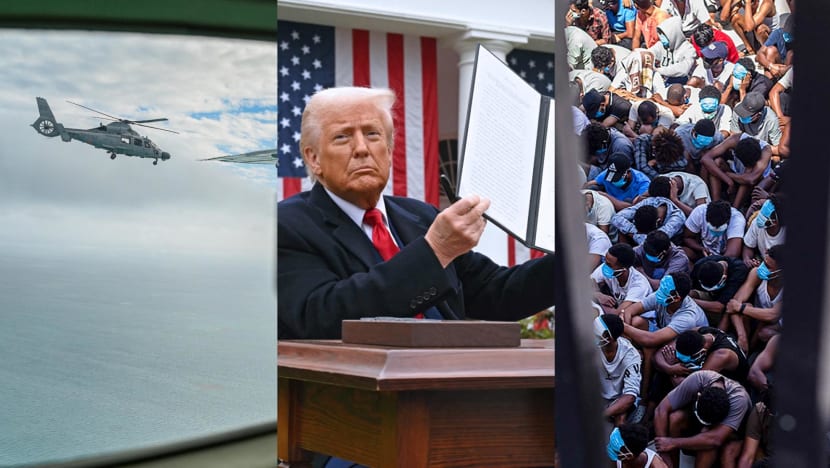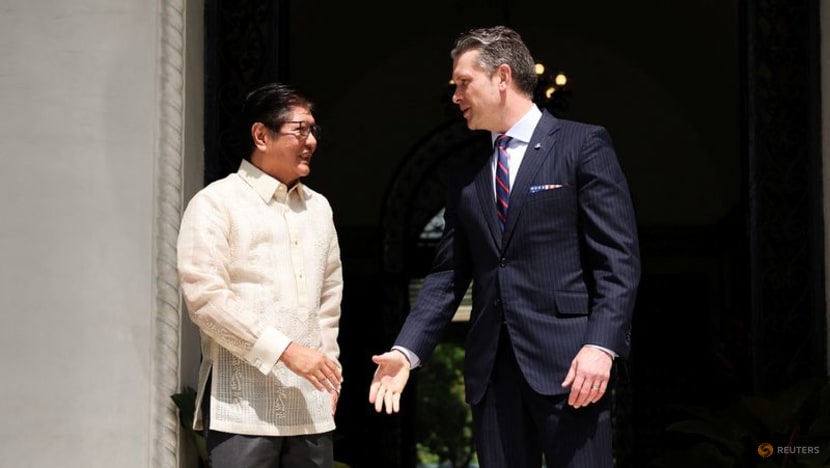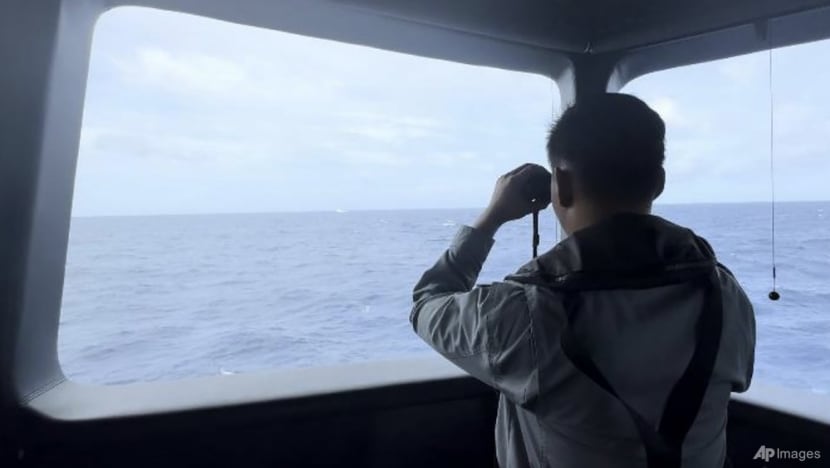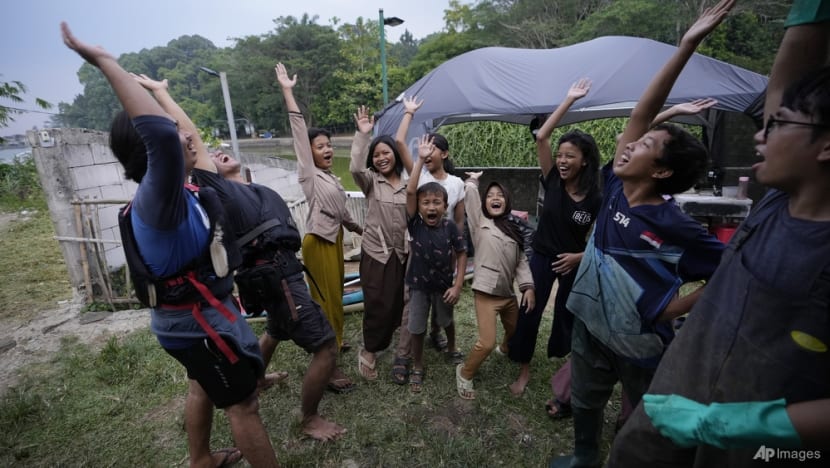Trump 2.0 among Southeast Asia’s top preoccupations in 2025, survey finds
With President Donald Trump back in the White House, new US leadership shot up on the list of Southeast Asia’s geopolitical concerns in an annual survey by Singapore’s ISEAS-Yusof Ishak Institute.


This audio is generated by an AI tool.
SINGAPORE: Aggressive behaviour in the South China Sea, global scam operations and the new United States leadership are the top three geopolitical concerns of Southeast Asian governments this year, according to thought leaders in the region polled by a Singapore research institute.
With President Donald Trump inaugurated for a second term on Jan 20, new US leadership shot up on the list of geopolitical concerns in the 2025 edition of The State of Southeast Asia survey by ISEAS-Yusof Ishak Institute released on Thursday (Apr 3).
Cited by 46.9 per cent of respondents, it saw a surge from last year when the 2024 US presidential election took 8th spot among 10 options, with only 18.8 per cent considering it to be among the top concerns of their country’s government.
The survey was conducted both online and offline between Jan 3 and Feb 15, with just under half the responses garnered before Trump took office, and the remainder after. There were “no discernible differences” in results recorded in the two periods, said ISEAS.
Since he took office, Trump has focused on countries with large trade imbalances with the US. The US Department of Commerce’s 2024 data shows Vietnam, Thailand and Malaysia are among them.
Sweeping tariffs are also due to come into effect on Thursday (Apr 3), with a 10 per cent baseline tariff on all imports to the US and higher duties on dozens of other countries.
Trump has also suggested Asian countries should pay for US security commitments.
The US leadership concern was particularly prominent among Singaporeans, with over 70 per cent of them citing it as a preoccupation, ISEAS found.
Its researchers noted Singapore would be impacted by any changes in US political, economic and defence policies because it is one of the US’ closest partners in the region.
“One of the biggest issues to have grabbed attention since the advent of Trump 2.0 are the allegations of export control violations of Nvidia chips in Singapore that enabled the development of China’s AI model DeepSeek,” the survey’s authors added.
MORE OR LESS US ENGAGEMENT UNDER TRUMP?
The State of Southeast Asia 2025 survey polled 2,023 people including researchers, private sector representatives, non-governmental organisations (NGOs) and government officials across Singapore, Malaysia, Indonesia, Thailand, Vietnam, Laos, Cambodia, Brunei, Myanmar, and the Philippines.
For the first time in its seven editions, the survey – which gauges views on geopolitical developments and issues affecting the region – included perspectives from Timor-Leste, which has observer status pending formal admission to the Association of Southeast Asian Nations (ASEAN). But Timor-Leste’s responses were not used to calculate average figures for ASEAN in the survey.
Asked about the level of US engagement with Southeast Asia under Trump 2.0, about four in 10 survey respondents (40.7 per cent) felt it would increase, or increase significantly this year.
Among those who felt this way, more than a-third (38.7 per cent) said Trump’s tough stance on China would help maintain a balance of power in the region. This sentiment is mostly shared by Laos (45.8 per cent), Singapore (43.9 per cent) and Myanmar (43 per cent).

On the other hand, nearly a-third (31.8 per cent) of respondents felt US engagement would either decrease or decrease significantly during the second Trump term, with Singapore being the most pessimistic (50.4 per cent), followed by Malaysia (48.3 per cent) and Thailand (40.9 per cent).
More than half of those who anticipate a decline in engagement attributed it to Trump’s unpredictable character in approaching foreign policy, which would add uncertainty to Washington’s engagement in the region.
Last year – the final year of the Biden administration – about three-quarters of respondents in ISEAS’ survey felt US engagement was either unchanged or had decreased.
SOUTH CHINA SEA TOPS GEOPOLITICAL CONCERNS
This year, the South China Sea issue overtook the Israel-Hamas conflict as the top geopolitical concern for ASEAN, with over half or 51.6 per cent of respondents citing it as one of three top concerns of their country’s government.
This was followed by global scam operations (48.1 per cent). Both issues rose a spot from the previous year.
On the South China Sea, ISEAS noted that last year’s series of altercations at sea between China and the Philippines have elevated the risks of an accidental conflict considerably, with the clash in the disputed Second Thomas Shoal stand-off being the most serious incident to date.
Anxiety over the contested waters was most pronounced in the Philippines, one of the claimant states, where 90.3 per cent respondents ranked it as the top concern.
Respondents from other claimant states like Vietnam (49 per cent) and Brunei (45.6 per cent) also said it was a top preoccupation.
Asked what their top South China Sea concerns were, respondents cited China’s encroachments in the exclusive economic zones (EEZs) and continental shelves of Southeast Asian states with coastlines (48.2 per cent), as well as an accidental confrontation between an ASEAN member state and China (44.3 per cent) that results in a political crisis.
Increased concern about aggression in the South China Sea is “not surprising” given the escalation of disputes between China and claimant states in the past two years, experts said at an online discussion on Thursday to announce the survey findings.
The maritime dispute is a “lived experience” for Indonesian fishermen, said Yenny Wahid, director of the Wahid Foundation in Indonesia, which promotes tolerance and multicultural understanding.
Indonesia is not a claimant state in the South China Sea, but China’s U-shaped nine-dash line extends to waters off Indonesia's Natuna islands, and Chinese coast guard vessels in the North Natuna Sea have been a source of bilateral tension.
“It is about sovereignty, about dignity and economic survival for our people,” she said.
On how ASEAN should respond to South China Sea tensions, the majority of respondents (69.5 per cent) said a principled stance on international law is the most important, upholding the 1982 United Nations Convention on the Law of the Sea (UNCLOS) and respect for the 2016 ruling by the Permanent Court of Arbitration.
The intergovernmental organisation ruled that Beijing’s claim to almost the entire South China Sea was groundless, but Beijing does not recognise the ruling.
Respondents from Indonesia showed the strongest support for this response at 85.3 per cent – even higher than the Philippines (80.3 per cent), which brought the 2016 case against China.
The least favoured responses to the tensions were discouraging non-claimants from getting involved (22.4 per cent), the fatalistic view that ASEAN “cannot do anything because of the absence of solidarity” (13.3 per cent) and welcoming other military powers in the South China Sea (12.7 per cent).
Asked about the Code of Conduct on the South China Sea, for which ASEAN and China began negotiations over a decade ago, the top approach favoured by four out of 10 respondents was alignment with international law.
Yenny said ASEAN must push for a Code of Conduct with clear enforcement mechanisms and invest in maritime capacity building.
ASEAN unity “must evolve”, she said. “Unity does not mean waiting for unanimity. A coalition of commitment, a group of ASEAN states willing to act within the bounds of law and collective interest might be necessary to move forward.”
The second-ranked view on the Code of Conduct is that it should prevent other powers from conducting military activities and energy exploration with member states.
“This shows that ASEAN wants the dispute to be resolved between ourselves and with less external interference,” said Liu Lin, a professor at the Party School of the Central Committee of the Communist Party of China.
She also said South China Sea tensions do not “just depend on China’s attitude or China’s actions”, but also that of other claimant states.
The Philippines’ approach has “changed a lot in the past several years” through enhanced military cooperation with the US, increasing maritime patrol and coast guard presence, among other actions, she said. It is also “hyping up” the issue in the media, she added.
While China is also concerned about Vietnam’s island reclamation in the South China Sea, both countries are having negotiations and discussions on the issue, she said.
South China Sea tensions provide an opportunity for ASEAN to adopt a more collective position, said fellow panellist Peter Varghese, chancellor of Australia’s University of Queensland.
“If it’s the underlying power imbalance which is a key part of this, then collective action can help (with) that,” he said.
Global scam operations was the top geopolitical concern for Thailand and Laos, two countries that have been used by syndicates to host operations.
After Chinese actor Wang Xing was abducted in Chiang Mai and was forced to work in a scam centre in Myanmar, Thailand recently cooperated with China to tackle the scourge by cutting off electricity to compounds housing thousands of scam workers across its border with Myanmar.
CLIMATE CHANGE IS SOUTHEAST ASIA’S BIGGEST CHALLENGE
Beyond geopolitics, for the first time since the survey was conducted in 2019, climate change was identified as the region’s biggest challenge, topping unemployment and economic recession worries which had dominated the list of challenges for the past two years.

More than half or 55.3 per cent of Southeast Asians said climate change and extreme weather events were the region’s top challenge, especially those in the Philippines (70.9 per cent) and Vietnam (70.3 per cent), two countries that experience strong typhoons.
More than 50 per cent of people in Malaysia and Thailand also said climate change has impacted them.
With more ASEAN countries also joining groupings such as BRICS, which consists of emerging economies including India, Russia and China, ISEAS sought respondents’ views on such collectives.
Over a quarter (26.2 per cent) agreed that ASEAN should strengthen its convening power and influence to ensure its members remain committed and discourage them from joining other groupings.
Nearly a quarter (23.8 per cent) said member states should be mindful of joining groupings that risk undermining ASEAN centrality, while roughly the same number (23.5 per cent) said ASEAN should join these other groups as a bloc to pursue regional interests.
One in five felt (20.2 per cent) said individual ASEAN countries are free to join any grouping that meets their national interests.
The remaining 6.2 per cent of respondents said ASEAN should not join any grouping and focus on pursuing multilateral cooperation. This, according to the authors, shows the member states’ pragmatism in “keeping all options open” even as they claim support for ASEAN centrality.




















